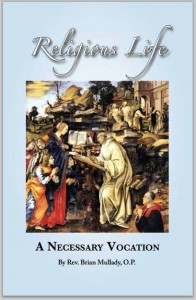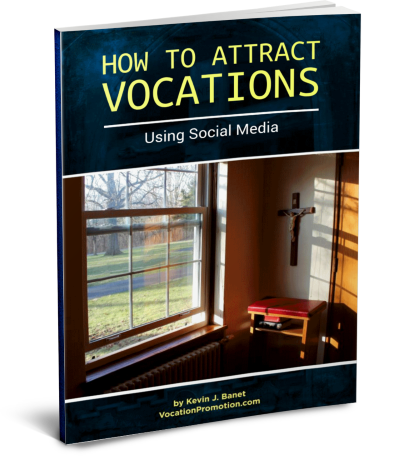New e-book by Fr. Brian Mullady, O.P., published by IRL available here.
 Free e-book download —
Free e-book download —
Religious Life: The Necessary Vocation,
by Fr. Brian Mullady, O.P.
As a vocation director, you make phone calls, attend conferences, send emails to bring in qualified candidates — but your best efforts may be hampered or even frustrated.
You may be very well-intentioned: trying to attract good Catholic people to your congregation, explaining to them how they can fulfill God’s will in their lives by giving themselves entirely to the Master, in the light of your charism and mission. But you may not even be aware one single flaw in your approach that has poisoned the well of your vocation efforts.
And yet, like a tiny worm that infests and destroys a large tree, the wrong way of thinking can pervade your best efforts. Long ago, Aristotle said that a small error made in the beginning can wreak havoc in the long run.
Gnosticism’s Unnecessary Mystery
The problem is pervasive everywhere — it is the error of Gnosticism, and it’s rearing its ugly head today. Let’s go back in history. Prior even to Christianity, followers of Gnosticism preached the heresy that a certain “hidden” or private knowledge is given to a select few, and was necessary to achieve salvation. The heresy was condemned by the Early Church Fathers, but aspects of Gnostic beliefs remain alive today.
The Church today deals with an offshoot of this fallacy in many ways of life, and to be frank, it may be affecting your whole approach in vocations. You see, some try to promote an “unnecessary mystery,” claiming that a religious vocation is a private experience of God, meant for a select few, and similar to a private revelation.
As we are well aware, discernment to the religious life is difficult at best. The notion unfortunately exists that only a very few souls are called to serve in this way, and that a personal, particular calling must be strongly experienced. Emotion has become the measuring stick for truth, and the presence of Grace is regarded as a feeling.
Truth Reduced to Emotion
Threating religious vocations as well is idea that “absolute certainty,” which our culture insists upon, is necessary before embarking on any commitment. Four hundred years ago, Descartes questioned the possibility of truth being derived from ordinary sense experience. From that time onward, philosophers have tended towards denying objective and universal truths to the point that truth has become reduced to emotion. Whether in marriage or religious discernment, one is expected to make decisions on emotions rather than objective certainty. When a single doubt arises, the “absolute certainty” needed to commit has been lost.
What can we do about all this?
Working with the Institute on Religious Life (IRL), we at Vocation Promotion are making available a handy e-book which deftly answers these questions and proposes solutions. And right now, it is available only on this website.
The IRL, seeing a desperate need for bringing the wisdom of the Church into this whole argument, arranged for a top expert, Fr. Brian Mullady, O.P., who is well-known for his lucid Thomistic thinking, to straighten our minds out. The result is a 16-page e-book, “Religious Life: A Necessary Vocation,” now available from the IRL.
In this e-book, there are many gems — you’ll also discover, for example, how during discussions at the Second Vatican Council, it was feared that the faithful would see religious as no more important than the call to holiness that the laity share. You’ll also learn how this notion was countered.
Free e-book download — Religious Life: The Necessary Vocation, by Fr. Brian Mullady, O.P.
Why not also visit the website of the Institute on Religious Life for more of the best vocation resources available?
